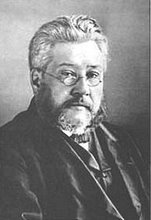Three kinds of salvation, all by God's grace
 In the comments section of the recent guest blogger posting by Cori (which has generated an interesting discussion, by the way!), Traveller left this question for fellow blogger John:
In the comments section of the recent guest blogger posting by Cori (which has generated an interesting discussion, by the way!), Traveller left this question for fellow blogger John:
This may seem a bit off topic but do you think that a person can be a follower of Jesus without actually articulating an answer to the questions you ask them? In other words, is being "saved" an event that occurs at a point in time just by agreeing to propositions of fact/truth? Or, is "salvation" more than that? Or, something different if not more?
Dear Traveller, I agree that this comment is a bit off topic, so let's start a new topic! Last Wednesday our pastor (Rev. Wigle Tamboer) talked about three kinds of salvation: past, present and future.
In the past Jesus Christ died for our sins - once and for all. This kind of salvation is called justification. But there is more salvation to come, because in the future our Lord will return and then our "lowly bodies" will be transformed into his likeness. This salvation can be called glorification:
But our citizenship is in heaven. And we eagerly await a Savior from there, the Lord Jesus Christ, who, by the power that enables him to bring everything under his control, will transform our lowly bodies so that they will be like his glorious body. Philippians 3:20-21
In the meantime, we are still living in this fallen world, but we are undergoing a third kind of salvation, called sanctification. In this process we are growing into the likeness of Christ - the Holy Spirit is changing us from the inside out.
Christians agree that the first and last kind of salvation are worked out by grace alone. But it seems like we are playing an active role in our sanctification process. In reality, it is God's grace again, working in us through his Holy Spirit. If we have the power to grow spiritually and if we have the discipline to read the Bible, pray and actively participate in our faith communities (Hebr. 10:25), this is still a matter of pure grace. In other words: this is God's power at work in us!
Back to the point our friend Traveller raised: is there a connection between our salvation and our knowledge of a certain kind? My answer to that question is: if we know anything, it is - again - only because of God's grace. We are not in the position to earn salvation, not by the works of our hands, nor by the thoughts of our minds. God is only asking us to allow his grace into our lives, so that He can save, sanctify and change us into the likeness of his Son. The only thing that is required from us is FAITH.
In other words, I believe that it is all God's work. If this was not the case, we could still claim that we are saved because we came to the right conclusion. The Bible states that it is God who is saving us. His saving grace goes out to us, his Son died for us, his Spirit dwells in us and his Word enlightens us. All we are asked to do is: accept God's grace. It's undeserved, it's incomprehensible and the good news is: it's 100% free!
PS What a coincidence! ;-) This is the Verse of the Day:






.jpg)



























15 comments:
As the question is/was addressed to me I suppose it is only fitting that I answer first...
Traveller, "is being "saved" an event that occurs at a point in time just by agreeing to propositions of fact/truth? Or, is "salvation" more than that?" A fine question which deserves a fine answer...I hope I can oblige.
Yes, being "saved" is an event that occurs at a point in time. No, being saved does not happen by agreeing to propositions of fact/truth. Being saved is, as our friend Paul has so eloquently stated, an act of God's grace. And to your final question, "is 'salvation' more than that?" - ABSOLUTELY!
Allow me to begin with the "point in time" issue. Every natural birth happens at some point in time. Likewise, I believe, that every spiritual birth (i.e. being born again - Jn 3:7 BTW - the "you" is plural in this verse) occurs at some point in time. I do believe there is a moment/season/time when someone moves from God's wrath to God's grace.
Next, agreeing to propositions...I think it critical for someone to recognize their position as a sinner before they can come to salvation. After all, if I'm O.K. why do I need to be saved? Furthermore, if I'm NOT O.K. how can I be saved? These are the simple truths which help me to rightly relate to the living Savior. Does simply saying the right thing save me? NOT AT ALL! But these truths help me enter into that saving relationship rightly. Can someone be "saved" if they do not affirm that they are out of sync with God's plan for them? Can someone be saved if they do not believe there is one capable of saving them?
Is 'salvation' more than that? Again, Paul has wonderfully articulated my understanding of this journey. Salvation is finished fact (new birth - justification), a continuing process (life in Christ - sanctification), and a future promise (eternity with him - glorification). As I indicated in our other conversation, the prospect of knowing and loving Christ is an ongoing adventure of discovering the grandeur of His grace and the marvel of His love.
There are things I can know about Him but they are merely the starting point in the relationship. These truths also serve as guide stones along the way. He will always be true to His revealed character.
Truth is not some dry crust of bread on which to subsist. It is glorious, warm, aromatic loaf to be broken and shared at the table with Him. Like those gentlemen on the way to Emmaus, we discover that our hearts burn with passion when He who is the truth speaks words of truth to us!
Blessings!
Yes, John - and as the host of this blog I should have waited for you to give an answer first, I do apologize for interrupting the discussion (please feel free to continue, I'm learning from you guys), but I did want to raise this discussion to the next level - i.e. turn it into yet another blog post ;-)
I have not died up here in Rochester; I’m just very busy. I started to draft a response to Cori’s posting but the next time I looked you had all outpaced me.
I think that the question of what constitutes salvation and being born again is the most complex issue of Christianity.
I have always found the question, “are you born again?” to be somewhat irritating. For me it has been a process akin to Russian matryoshka dolls, where I think that this time I have died to self, only to find that there is another shell of ego in there. I understand this is the process of sanctification that Paul is talking about and, for the record, I’m pathetic at it.
As with the “Kingdom of Heaven” statements, it is unclear whether John 3 is referring to eternity or God’s kingdom on earth. I think in the fullest sense it refers to both.
My friend, an agnostic, attended a funeral yesterday which included an altar call. The preacher said, “If you get to the point where [the deceased] is, and you haven’t given your life to Jesus, it’s too late.” In principle, I agree with his theology. However, did you ever see the testimony of Ian McCormack? He was caught between life and death and had an encounter with Jesus. His experience doesn’t fit with that theology and yet, and yet… if his experience is valid, how many other people have met Jesus at death’s door and been escorted into Heaven?
My father was a cradle Baptist, Sunday school teacher… and then he lost two kids, four years apart. He was heartbroken and furious at God. He was bitter and alienated and never went back to church. He was tested and he broke. (Be cautious before you say that could never happen to you…) I can’t resolve his experience with my theology, and yet, and yet... For me the idea that my father and siblings are consigned to eternal hell is too awful to consider. So I fall back on the belief that my God is a merciful God and that I grasp only the smallest part of His mercy.
Those of us from a sacramental background believe that the sacraments represent God reaching down to us at the moment we are reaching up to Him. This allows for miracles, or at least for events beyond human understanding. After all, the Bible was written for man, and God would kind of have to use words of one syllable for us, wouldn’t He?
I think I would take the question Traveller asked even farther, to mean, “Is it possible to be an unenlightened Christian, a follower of Christ who doesn’t get there by words or a specific act of accepting Jesus?” The answer, to me, is: of course. Who am I to set limits on God?
On the other hand, for those of us who have had the opportunity to hear the Word, there is an expectation that we not reject salvation. For us, I think it IS required that we enter the process of sanctification.
Carol,
You are correct this is a complex subject. Part of the complexity revolves around the language differences between when the biblical texts were written and today. We also have to factor in the Hebraic thought process which is different than western thought. In fact this conversation would not exist in ancient times, as first century Jews saw secular and sacred all part of one experience.
So is being saved an event that occurs at a point in time? I would have to agree with John and say “yes”. Throughout the New Testament when someone encounters Jesus and turns to him we have a point in time experience. The same in Acts, people are confronted with the gospel message and they turn and repent. Now, I think we can all agree that these people had varying degree of knowledge. No-one is saying that you have to have a degree in systematic theology to find salvation. But, throughout the NT there seems to be the following repeated patterns.
1. The people or person recognizes to some degree who Jesus is.
2. They want to turn from there life of sin and follow him.
Early Christians didn’t subdivide the topic of salvation, they saw it as past, present and future all rolled into one. They didn’t try and break it apart like we do.
One thing I find interesting is how much emphasis the early church did place on truth. They really pushed new believers to gain a full understanding of the gospel. This was done through many methods, which if employed today would drive many people out of the church.
So to Paul’s question concerning knowledge at the point of salvation. I would have to say that whatever is revealed to us at the time of salvation is an act of GOD’s grace and power. I don’t think we can place a measurement on what GOD revealed. I leave the last word to the apostle Paul,
Oh, the depth of the riches of the wisdom and knowledge of God! How unsearchable his judgments, and his paths beyond tracing out Romans 11:33
If there is a "moment" of salvation, what was that moment for Nicodemus or Joseph of Arimathea? Theirs appear to be gradual conversions which we see only by reflection through their deeds.
Carol,
Good point. But as time is a series of moments, I assume there was a point when they became aware.
I get where you are coming from. I don't think we can pin this down. I prefer to leave it in GOD's hands.
C.H Spurgeon used to wait six to eight months after a confession of faith, to see if it was the real deal.
Paul, thanks for starting the new post. I have enjoyed the comments as well.
In asking the original question I was not attempting to take a position different than what you have articulated generally Paul and John. Of course, one can get into a lot of Calvinist/Arminian discussion on this that is not needed for this conversation. However, I do think Carol has some good points.
My point was that in Enlightenment/Modern thinking we try to make things a logical, orderly and easily understood process. I agree with Carol that this is not so easily understood even though beginning a relationship with God is simple in some respects.
Unfortunately, while John may not use the words he stated, or intend them in such a way, often we convey to those seeking a relationship with Father through Jesus, that all they have to do is state some formulaic words and presto they are Christians. This is one of the points of many "emerging" thinkers. We need to understand that individuals come to Jesus in different ways and may, or may not, follow the exact thought or expression process that others do.
I find it interesting that we so often say a person needs to be "born again". While I do not have a problem with using this illustratively, Jesus only said this to one person, Nicodemus. He said to him because for Nicodemus being born a Jew, male and a Pharisee was by definition what made him in relationship with God. Jesus wanted him to understand that his birth in the ways he thought important meant nothing to God. He needed to be "born again" without regard to those factors. Jesus spoke to each person individually based on where they were in life and what he discerned they needed to hear in order to encounter him that day. He never used a rote "4 Spiritual Laws" to bring people to Father.
Traveller,
You make a good point. Much harm has been done by creating formulars. Such actins include some and exclude others.
There is nothing wrong with trying to understand a process. But we must not lose sight that GOD is far more dynamic than we can ever imagine. Having said that, the Lord never moves beyond His word.
Mike, I concur that God never moves beyond his word. However, I think God often moves beyond our interpretation, or misinterpretation, of his word.
Dear Traveller,
In John's defense, he is anything but a rote thinker. Not that I believe that's what you meant to imply, but I must mention it.
I really hate to use the terms Calvinism and Arminianism as they tend to imply a host of beliefs arrayed on opposite sides of a fence that may or may not be there. As someone who sits squarely on the ground that fence is supposed to occupy I don't like being shoved to one side or another.
Have a great day!
Carol
Carol, thank you for your thoughts and insights. For clarity, I was not trying to force you into a position regarding Calvinism/Arminianism. The last sentence of that paragraph was supposed to go with the following paragraph. It was an editing error on my part. My apologies for creating the confusion.
John, thanks for the link to the article. I think it is a good and insightful.
N. T. Wright has just published in the US his latest book which deals with this as well, obviously in greater depth. It is entitled "Surprised by Hope: Rethinking Heaven, the Resurrection and the Mission of the Church". It is a challenging and thought provoking read. I highly recommend it.
Carol,
Thanks for the kind words. I hope Traveller recognizes that I am not advocating an empty intellectual assent to a set of propositional truths as a means to salvation. Surely I have represented my position better than that! It always the living Christ with whom we must come to grips. I just want us to be certain who we are talking about.
Also, you mention the image of the matroyshka dolls. Good picture. I have a sainted lady in the congregation I am privileged to shepherd who cannot remember a particular date and time of making the decision to follow Christ. She is what I like to call an "evolutionary Christian" - it was simply a natural progression for her. There are others for whom this new birth is a radical event, I call them "revolutionary Christians". The point is, they have all moved from condemnation to peace. How? Through an encounter with God's grace.
Traveller,
I certainly don't want this discussion to devolve into the same old hashing of the Calvin v. Arminius discussion. I get quite frustrated by immediately being pigeonholed into one camp or the other - when in fact I am neither.
I do agree that the usage of some tools like the "4 Spiritual Laws" (never used it myself) can lead to empty and meaningless professions. I used to be one who loudly decried using such methods, I still do not like them preferring to build a relationship and demonstrate the love of Jesus in word and deed. However, I have come to the place that I recognize God is able to use even these means to draw people to Him. I have a friend who, to this day, carries a tract he picked up in a bathroom. It was the turning point in his life. Some simple propositions led him to a life changing encounter.
Blessings all!
John
John, I had no intention to accuse you of using empty words. Indeed, I tried to point out that you did not intend them that way. Nevertheless, I sincerely apologize if any words or phrasing I used conveyed that impression to you or Carol.
Ahh Traveler,
We have fallen victim to the peril of this form of communication. Interesting parallels to our discussion I think. In this form of communication all we have are words (propositional truths?) and no real understanding of the people behind them (relational aspect of salvation?) If you only "knew" me you would be confident that it takes a great deal to offend me and therefore you can say what is on your mind/heart with freedom, trusting that we can work any misunderstanding out along the way.
I assure you that I am not hurt/angry/offended/miffed (fill in whatever adjective suits you here), in fact, I am engaged/charged/intrigued/excited by the civil exchange of ideas we are sharing. Thanks for hanging in there with the conversation.
Blessings!
John
John,
Thank you for your gracious reply.
I agree that this form of communication does have its limits even though, at the same time, it has its signficant advantages.
Post a Comment